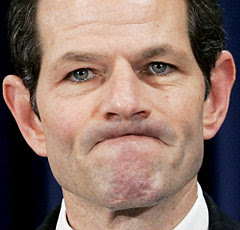
Once upon a time, the City of New York had a shitload of money, just burning a hole in its pocket. No one could figure out what to spend it on -- the city had no homeless or jobless citizens, and all the New Yorkers already had everything they could possibly need!

Along came a man named
Eliot Spitzer. He was a modest guy who, at various points in his life, had spent his time
upholding the American tradition of wealth-based social hierarchy,
prosecuting others for crimes he committed himself,
"steamrolling", taking the meaning of
hypocrisy to a new level, and being every high-end hooker's
worst nightmare. Mr. Spitzer was the governor of New York.
One day Mr. Spitzer had an idea for how to spend some of that ever-flowin money. New York City would rename the Triborough Bridge! Mr. Spitzer would get lots of publicity, make a bunch of rich and powerful people feel all warm and fuzzy inside, and, best of all, kiss the collective ass of one of the most powerful families in the country.
And so it was decided. For a substantial but
entirely reasonable and worthwhile cost of
$4 million dollars, the historic Triborough Bridge would become a completely new feature in New York City's landscape and history. Wellll, OK, technically it would be the same exact feature as it always was. But it would have a new name!
Some unpatriotic fools voiced opposition, making unreasonable points regarding the untimely nature of the change. Councilman Vallone of Astoria, for instance,
said:
"Robert Kennedy was a great man, but this isn’t the time. While one agency that gets money from the state is raising fares and cutting service to the neighborhood at the foot of the bridge, another has somehow found a way to spend millions of dollars on changing the signage of it."
Oh come on, Vallone! As if
anyone could think of
anything better the city could be spending money on right now!!
 His new book argues that holiday gift-giving is not only stressful but in fact economically unsound. That's because the money spent on presents (especially when they're bought in a caffeine-fueled frenzy on December 24th--wait, is that just me?) doesn't follow the same rational patterns that other spending does.
His new book argues that holiday gift-giving is not only stressful but in fact economically unsound. That's because the money spent on presents (especially when they're bought in a caffeine-fueled frenzy on December 24th--wait, is that just me?) doesn't follow the same rational patterns that other spending does.




